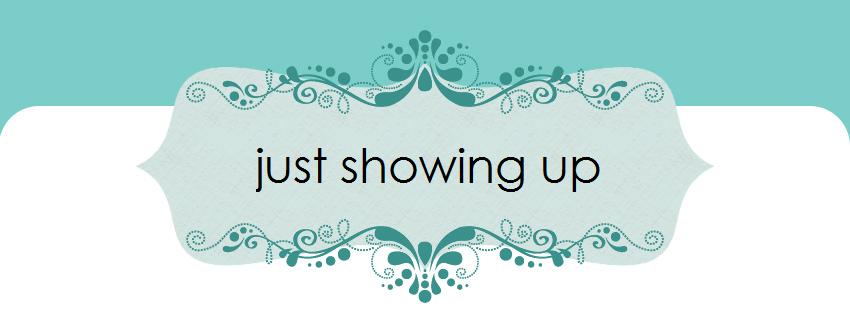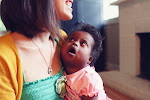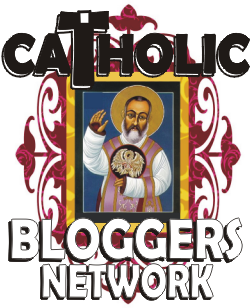A recent Mother Jones article by Kathryn Joyce has the adoption community all abuzz.
With a title like "Orphan Fever: The Evangelical Movement's Adoption Obsession", you can see why.
This "orphan fever" phenomenon among evangelicals has actually intrigued me for a long time now. Because adoption is not only common in evangelical circles, it has spread like wildfire. If you don't believe me, consider that adoption ministries, organizations, agencies, support groups and grant funds have exploded in recent years. When we brought our sons home in early 2006 for example, there were five agencies placing children from Ethiopia. Within a few years that number had jumped to well over fifty. It's simply a fact: evangelicals have the corner on international adoption.
Although my husband and I are now Catholic, we attended an evangelical church for many years. But we completed our own adoption before the evangelical orphan movement really hit its stride. So my experience adopting within evangelical subculture was a bit different from what things might look like for an evangelical today--we didn't know anyone else pursuing adoption, we didn't know any adopted children, and so we found our adoption community online. And that community was a mix of people, evangelicals and Mormons and Buddhists and Methodists and people not claiming any sort of spirituality whatsoever. It honestly felt as if we had quite a lot in common with those folks. They spoke our language. They didn't question our sanity for jumping from one to three children.
So we didn't have the experience of being inspired to adopt by a Rick Warren sermon or an adoption ministry at our church, or by a sappy video presentation set to music. Instead, we felt called by God to be a family and home to children presently living without them. In what was essentially a vacuum. I believe it was God who planted the thought in my head that led me to research the global orphan crisis for the first time and question what we might do about it. Through prayer and discussion, my husband and I discerned that we were in a reasonably good position to open our home to vulnerable children.
And so we have done that, four times over. We adopted my sons out of a disruption (their first adoptive family changed their mind in-country), and my daughters both waited some time for a family because they were born with Down syndrome and serious heart defects. I know for a fact, after having met my children's respective birth mothers, that there were few options for these kids. Each of these women relinquished for different reasons, but the one thing they had in common was that they felt genuinely unable/unwilling to parent.
My interest in evangelicals and adoption has only grown since converting to Catholicism, because international adoption seems to be more or less unique to evangelicals. In other words, international adoption is not nearly so common among Catholics or other religious/nonreligious groups. For whatever reason, it is the evangelical Protestant subculture that has somehow managed to build an entire theology around adoption, mobilizing thousands of couples (most of them perfectly capable of having more biological children) to cross the globe in order to add to their families. It's rather fascinating really, and indicative of a question that I believe many evangelicals are asking: what is the purpose of the church? Of faith? Of a relationship with Jesus? Is there more to Christianity than a good sermon and Chris Tomlin choruses sung over and over again?
Those questions honestly make sense to me, because I started asking them myself once upon a time. (Watch out by the way, because if you dig too deep and read too many papal encyclicals and Scott Hahn books you might wind up reconciling with the Catholic Church. Just sayin'.) Protestants have of course answered those questions differently throughout the centuries, and adoption seems to be one of the primary "answers" right now for evangelicals. They tout scriptures like James 1:27, and use the fact that we are all adopted by God (a la Ephesians 1:5) as a sort of mandate or justification for adopting orphaned children.
I have even seen adoption become a litmus test for being a Christian (or for being pro-life) within evangelical circles--if you truly want to follow Jesus, you'll care for the orphan in this way. If you really believe abortion is wrong, you'll put your money (and life) where your mouth is and adopt. All of a sudden, the conservative evangelical standard had been raised from reading the Bible and going to church each week to claiming vulnerable and abandoned children as your own. And this shift in thinking and religious practice has manifested itself in what we see today: a booming international adoption infrastructure and, in the case of the agencies placing children, business.
And people are sheep. We like to follow. This is evident in everything from fashion and decorating trends to what theological ideas we subscribe to. And I really, truly believe it is supposed to be this way. Jesus wants us to be one, to be united in following and worshipping Him. But of course this group-think tendency leaks out into other areas too, and that includes the area of adoption. People see other people doing it and pause to consider if it might be for them, too.
And so it is this natural tendency to trend after other people, coupled with the religious verbiage enshrining adoption as the gold standard of Christian living, that has laid the foundation for the evangelical adoption movement. Orphan fever.
But there is also a different movement rising up, from both within and without this very circle of evangelical adoptive parents. This movement is, interestingly, a backlash against evangelical adoption culture. Rather than focus on the orphanhood of children and the need for them to find parents, it primarily addresses family preservation, child trafficking, and the ethics surrounding relinquishment, abandonment and adoption. It asks hard questions like, "Does the imbalance of power render adoption intrinsically unethical?" And "Have adoptive families harmed, more than helped, a particular culture by creating a demand and normalizing relinquishment?"
Good questions, all of them. We adoptive parents are well-aware of the ethical complexities of international adoption, or at least, we ought to be. We've heard the horror stories and seen the news specials and read the articles detailing falsified documents, village harvesting, and birth parents who believed they were merely sending their son or daughter away to attend school for a time. We've become familiar with the agencies that raise red flag after red flag--if you want to see an adoptive parent of an Ethiopian child fly off the handle, mention the acronym CWA. You'll get an earful.
So this reaction we are seeing, this questioning and rethinking of international adoption, is not unfounded. It rightly points to some things that are highly problematic, and is rooted in something that I believe is very, very true and right: children ought to be raised by the mother and father who conceived them. Marriage itself is ordered towards "the procreation and education of children", and God created marriage--and the children that result from that marriage--as the very building block and foundation of society. It therefore behooves the culture to have strong, intact families. Brain development, mood regulation, sensory integration, the ability to make sound decisions, attachment capability--all of these things are made to be nourished within the biological family. And all of these things are profoundly affected when that process is disrupted.
There is, therefore, really no room for romanticizing international adoption. No need to put a glossy, rosy spin on what was most certainly not the ideal for a particular child or for his or her birth parents. Like anything else diverging from God's intention and natural law, it is an outlier of sorts, a deviation that only occurs because our world is broken and humans are corrupted from conception. Whether it is a government which oppresses its people to the point of extreme poverty, or simply a momentary bad decision, there is the stain of sin most anywhere you look. Enter the very real problem of the disintegration of the family. Enter the very real problem of the existence of orphans. Of stigma. Of disease. Of corruption, which is alive and well within an industry where thousands upon thousands of dollars are exchanged, often between desperate families and greedy entities who stand to profit a great deal.
So you won't find me arguing that family preservation is not the generally-better way to do things, and you won't find me gushing about how God preferred my husband and I over our adopted children's respective birth parents. Ever. No matter how grateful I am to be raising these children.
But. And you knew this "but" was coming, right?
Just as I reject a happy-go-lucky, theologically based, look-the-other-way when it comes to ethics approach to international adoption, I also reject this new narrative emerging in evangelicalism, this new thing that refuses to acknowledge the nuance replete in the problem of the orphan, in the problem of a deeply impoverished culture where yes indeed there is an imbalance of power.
I reject it because, in part, I believe it ignores the human dignity inherent in the element of choice. In other words, I believe it sells birth families short, assuming that because they are poor in a developing country that they would have certainly preferred to parent their child--when, quite frankly, that is simply not the case for everyone. A mother or father, in my estimation, certainly has the right to relinquish a child for various reasons. It may be financially motivated. Perhaps it has to do with stigma, or medical issues related to the child. I have met each and every one of my adopted children's birth mothers, and while every situation was unique, each woman believed she was doing the right thing. So wouldn't it be presumptuous for me to argue that because I am in a place of power, that I know better than these women? That with a little money thrown their way they could parent instead? That I somehow have a good understanding of a culture in which I have never lived?
By NO MEANS am I saying that a dangerous trend has not emerged, where this sort of thing is normalized and even encouraged by both money-hungry vultures and well-intentioned adoptive parents, like myself. That is just a given. Relinquishment ought to be a last resort, for people who have been fully informed of what it means and what it doesn't mean.
But I am saying that my four adopted children were legally relinquished by informed women who knew they were saying goodbye for good. I am saying that my four adopted children spent years in an orphanage where sexual abuse occasionally occurred. I am saying that my four adopted children come from a country where very little domestic infrastructure presently exists for kids like them. I am saying that I know families who adopted children who had literally been abandoned, everywhere from busy marketplaces to trash cans. My children, and countless others like them, were left vulnerable and alone.
Not every internationally adopted child was trafficked, and not every birth mother wanted to parent. It is a fact, yes, that all of us adoptive families have paid money into a system where corruption sometimes exists. That is why some of us are now saying that we should have put those thousands of dollars not into adoption, but into community development, United Nations efforts, family preservation and the like. And I agree that we must take care to contribute in this way. But the problem is that there is corruption and problematic ideology among those groups too. (One small example of this might be the exporting of some of our own culture's ugly beliefs about marriage and children overseas, through the promotion of hormonal birth control and abortion. As if those are the answers. I assure you, they are not.)
Even under the most ideal of circumstances, the nuclear family will occasionally break down--we need only look at our own country to see that no amount of resources or money (or the aforementioned birth control) will completely erase the demand for abortion. Or the need for a foster care system. The affluent and educated are far from immune to addiction, divorce, abuse, and the aversion to having a child. So let us work for reunification, yes, but let us also acknowledge that even with all of our efforts, there will still be the problem of the orphan, who is in my estimation far better off growing up within the context of a family than in an institution--for the very reasons that reunification is ideal.
So to the uber-pro-adoption evangelicals, I say this: keep working on behalf of the orphan. Do your homework, be aware, try your hardest to avoid unethical situations and the creating of a demand for children (generally healthy and as-young-as-possible babies.) Don't assume a "Christian" agency is a good one. Know that there is the potential for corruption with any adoption. Know too that there are many children legitimately in need of families. Support each other and continue developing post-adoption resources because these kids have suffered a great deal and are coming from a background filled with trauma. Expect it to be hard, and do your best to present a balanced viewpoint when you're advocating for the fatherless. Avoid the temptation of reducing adoption to merely a feel-good redemption story. Tell the truth.
To the less-than-pro-adoption evangelicals: thank you for your acknowledgement of the importance of the birth family, and for your work towards family preservation. Please continue exposing unethical practices and calling agencies to task for their role in them. At the same time, remember that the problem of evil will not go away. Not all families will remain intact, and mothers and fathers must be given the space and the right to relinquish their children if they so choose. And not only that, but you must also refrain from demonizing what is arguably one of the best solutions for those children: adoption. Don't focus so exclusively on one side of evil's coin that you forget that some of our children would literally be dead were it not for agencies having a presence in a particular developing country.
As for me, I acknowledge that while there are countless ways to advocate for the orphan, my own personal experience compels me to advocate for the adoption of waiting children in those places lacking the infrastructure to care for them. Generous and responsible parenthood as defined by Blessed John Paul II, a marriage oriented to openness to life, is ripe for the parenting of the vulnerable and fatherless. Regardless what criticisms may be lobbed at the evangelical international adoption movement, it is a fact that there is indeed a legitimate need for families to adopt children.
At the same time, no, an authentic Christian faith (or pro-life ethic) should never be reduced to whether or not we're adopting children (probably the movement's biggest flaw, perhaps contributing the most to a blind acceptance of any and all adoption practices). On the contrary, we practice Christianity to have relationship with God and to spend forever with Him in Heaven. Jesus gave us His Church, His bride, to achieve this end. Period.
Instead we must think of adoption as a particular kind of openness to life and marital fruitfulness that some are called to do. It is not necessarily easy, and yet it is incredibly fulfilling and rooted in redemption. It is a good thing. Those of us parenting adopted children are not saints or superheroes, but instead receive the graces to do so as we need them--just like with any other thing, big or small, that God calls us to. It is a yielding of our own wants and desires and occasionally involves taking up our cross. It is a loving and proper response to the problem of evil, to Satan's attack on the family which crosses every culture and language and socieo-economic status.
Finally, to Ms. Joyce: I wonder if you are perhaps painting with too broad a brush? If some of your negativity is due to your own biases against religious orthodoxy and the pro-life cause, and towards progressive feminism? I suspect this is why you characterize evangelical adoptive families as Michael-and-Debi-Pearl-loving, Above Rubies-reading extremists. Which seems terribly unfair, when I consider the many adoptive families I know from all manner of religious and political backgrounds, who adopted for all manner of reasons. While I believe you make some good points, I also think those points can be made without oversimplifying the issues and launching a thinly-veiled attack on the Christian faith.
Because we Christians have, incidentally, been about orphan care and intact families since the Church's inception, roughly two thousand years. And I can assure you that evangelical, Catholic or otherwise, we are not about to give up on "the least of these" now.















